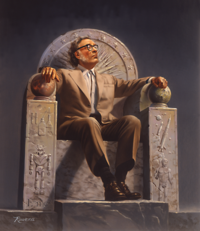- Science fiction in China
-
In China, science fiction (科幻, pinyin: Kehuan) has had more than a century of history.
Contents
Early translations
The history of science fiction in China began with the keen interest in the West that existed in the late nineteenth and early twentieth Centuries. Science fiction, a cultural phenomenon emerging from Western Europe's Industrial Revolution, was part of what attracted Chinese attention.
Liang Qichao was the first to announce the arrival of science fiction in China with his translation of Jules Verne's "Fifteen Little Heroes" into Classical Chinese (wen yan wen). The May Fourth Movement, with its advocacy of the cultural ideals of democracy and science, included the advancement of science fiction. Many famous Chinese scholars translated and wrote science fiction.
In 1903, Lu Xun, then a young foreign student at the Kobun Gakuin (弘文學院; Kobun Institute) in Japan translated Jules Verne's "The Cannon Club" and "Journey to the Centre of the Earth" from Japanese into Classical Chinese. Lu Xun then also modified these into another traditional Chinese style (zhang wei ban) and added explanatory notes. He rendered these stories into a wholly Chinese literary form. He translated many of Verne's and H.G. Wells' classical stories, advancing science fiction by his periodical publications.
Early Original Chinese Science Fiction
China's earliest original science fiction was "Yueqiu Zhimindi Xiaoshuo" (月球殖民地小說) ("Lunar Colony"), published in 1904.[1] The writer's pen name was "Huang Jiang Diao Sou" (荒江釣叟) ("Secluded River's Old Fisherman"). The story concerns Long Menghua, who flees China with his wife after killing a government official who was harassing his wife's family. The ship they escape on is accidentally sunk and Long's wife disappears. However, Long is rescued by Otoro Tama, the Japanese inventor of a dirigible. They travel Southeast Asia searching for Long's wife, joining with a group of anti-Qing martial artists, and rescue her from bandits. Deciding that the nations of the world are too corrupt, they all travel to the moon and establish a new colony.[1]
China's earliest purely literary periodical, "Xiao Shuo Lin" (小說林) ("Story Forest") founded by Xu Nianci (徐念慈) not only published translated science fiction, but also the original story "Xin Faluo Xiansheng Tan" (新法螺先生譚) ("New Mr. Tan Triton"). The famous writer Lao She also composed a story called "Mao Cheng Ji" (貓城記) ("Tale of Cat City") containing SF characteristics.
After Establishment of People's Republic of China
In 1949 with the founding of the People's Republic of China, science fiction literature continued to flourish. In this period the genre adopted a popular science approach and directed the majority of its stories towards the younger reader. Besides popularizing science, SF promoted the country's wonderful socialist future. The theme is comparable to the contemporary Soviet style of socialist literature.
Cultural Revolution
During the Cultural Revolution (1966-1976), science fiction stagnated.
The Deng Reform Era
In March 1978, the Central Committee of the Chinese Communist Party and the State Council convened a national scientific congress in Beijing, proclaiming to China, "Science's spring has come." Scientific enthusiasm and popular science followed, greatly promoting the development of science fiction in China. The publication of Ye Yonglie's "Xiao Lingtong's Travels in the Future" (小灵通漫游未来) marked the revival of science fiction literature in China.
Zheng Wenguang, called the father of Chinese science fiction, dedicated himself to writing science fiction in the 50s, and in the 70s again devoted himself to this task. He composed many important science fiction works. In 1980 he became a member of the World SF Association. A representative work is "Flying to the Centaur."
Tong Enzheng wrote "Death Ray on a Coral Island" which was made into China's first SF movie.
Other important writers of this period include Liu Xingshi, Wang Xiaoda, etc.
Ni Kuang
One major SF writer was Ni Kuang. He wrote numerous stories, many with the characters Wei Sili and Yuan Zhenxia. He was famous in other fields and has been praised for the number of his works. A representative Ni Kuang story is "Blue Blood Man" ("Lan Xue Ren"). Many Hong Kong movies have been made from Ni's stories.
Anti-Spiritual Pollution Campaign
In 1983-1984 Biao Qian labelled science fiction "spiritual pollution" in the "anti-spiritual pollution" campaign, which had grave consequences for the economy and culture. Ye Yonglie, Tong Enzheng, Liu Xingshi and Xiao Jianheng were condemned for slander, and the science fiction genre almost expired during this campaign.
Science Fiction World
In 1978, the publication Scientific Literature was founded, becoming the most significant SF periodical. Its editorial office was in Chengdu, Sichuan. Its name was changed to Science Fiction World (Kehuan Shijie). In the early 1990s it grew to become the science fiction publication with the highest circulation in China. In its pages appeared a large group of outstanding Chinese science fiction writers, including Xing He, Liu Cixin, Wang Jinkang, Qian Lifang, He Xi, and others. The magazine also presented major foreign authors and popularized science and science fiction.
1990s and early 21st century
In 1991 and 2000, China held international science fiction conventions in Chengdu and Beijing respectively.
On March 31, 2011, the State Administration of Radio Film and Television issued guidelines that strongly discouraged storylines including "fantasy, time-travel, random compilations of mythical stories, bizarre plots, absurd techniques, even propagating feudal superstitions, fatalism and reincarnation, ambiguous moral lessons, and a lack of positive thinking."[2]
References
- ^ http://io9.com/#!5788742/where-did-steampunk-come-from
- ^ http://business.blogs.cnn.com/2011/04/14/china-bans-time-travel-for-television/
External links
- Science Fiction, Globalization, and China paper
- Science Fiction Network (www.kehuan.net)
- "Science Fiction World" magazine official website
- Stills and stories from China's first sci-fi movie AsiaObscura.com
Categories:- Chinese science fiction
- Chinese literature
Wikimedia Foundation. 2010.

